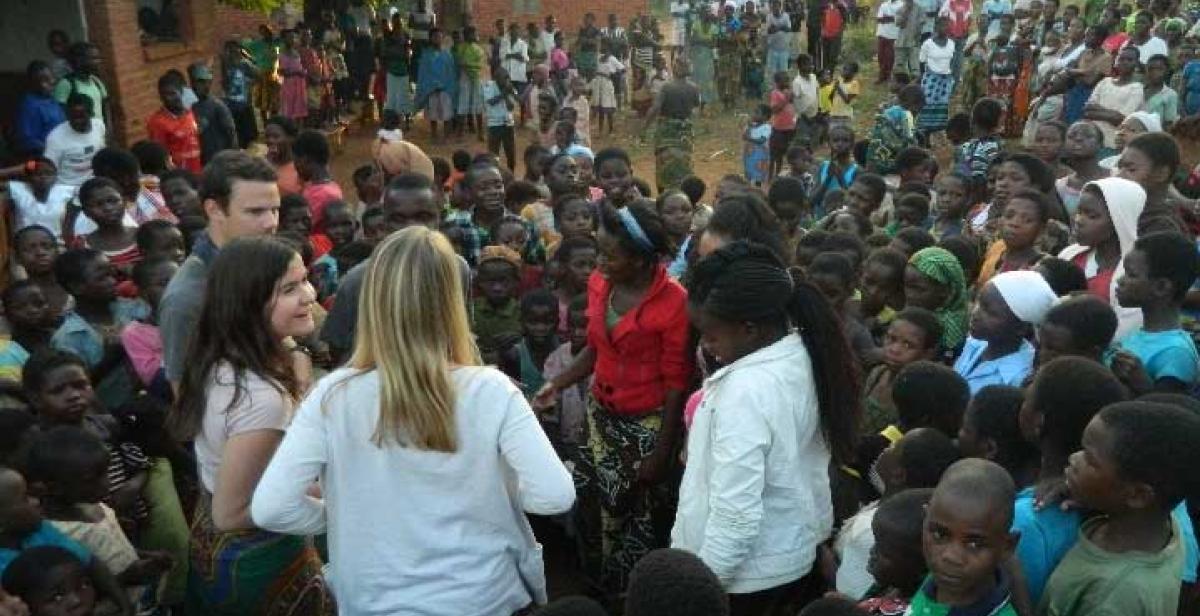One of our main focuses this past week has been the Action Research section of our target. This involved visiting 18 rural communities and extracting from them their knowledge on specific environmental issues pertaining to their surrounding areas. Prior to our field work, our Progressio volunteers underwent Monitoring & Evaluation training led by Henry Chinthuli, Mulanje Mountain Conservation Trust’s (MMCT) Project Officer. Knowing the Mulanje district inside out and having worked with MMCT for many years, Henry was able to bring a vast amount of knowledge and experience to the training, equipping us for the following day’s excursions.
Meeting at the office at 7:15am the first group kicked the research off by visiting five villages that run alongside the Mozambique border just south of Mulanje. The survey would act as an official meeting, where the village chiefs, committees and leaders came together to answer questions on behalf of the entire village. The turnout varied significantly from village to village, some would have 10-15 members present, where one village had an astounding 143 actively participating and answering questions. Due to such turnouts, the length of the surveys varied greatly with some surveys taking over four hours to complete. The questions asked were also very diverse, starting from basic information such as the number of households there are in the village or how many boreholes and taps there are in the community, to issues relating to the environment and what their approach was to certain sustainability guidelines and laws. One very important topic that was raised at the end of each survey was on the protection of Malawi’s national tree the Mulanje Cedar, this raised mixed emotions amongst those gathered, mainly that of anger and frustration at the laws enforced to curb the cutting down of cedars.
A crucial element of the survey was focussed on development. This was perhaps the most fascinating section, especially for the UK volunteers as it challenged our own understanding and definition of development. In many ways the very term ‘development’ has been the product of the West, and therefore is portrayed solely in the light of Western ideals and expectations. Many UK volunteers have come to Africa expecting to see Malawi in a significantly low position in perhaps the UN’s World Development Index or the World Bank’s latest statistics on the international economy. However we have come to realise that development cannot simply be measured in economic terms, something by which the West measures everything up against, but development is a concept that may differ from region to region. One of the first questions on the matter was ‘How would your village define development?’ We were actually asking them to define a word which they have for so long been a part of but never been able to have a say in. It was refreshing to hear their own interpretations on a word in which they have become statistics for. Answers ranged from food security, houses having steel roofs and access to clean water through systems like boreholes. That was it. Once this was achieved, they would see this as a relatively high standard of living.
Many skills were learnt during this exercise, which took up four very full days over two weeks to complete. Monitoring and Evaluation was an aspect most of the volunteers had never taken part in before and proved to be a fascinating learning experience. Not only did it test our National volunteers’ quality and speed of translating but also gave the UK volunteer an experience in conversing with village chiefs and village headmen.
Cedar Encroachment
The Mulanje Cedar tree is Malawi’s national tree and Mulanje Mountain is the only place it can be found. Due to its durable wood and high price it can fetch on the market, the cedar population has seen a significant decline. In response to this, law enforcements have been put in place to ban this type of forest resource extraction to ensure a long and healthy cedar community. MMCT have been one of the main instigators of this ban and have carried out much work trying to replenish the dwindling population. The collection of seeds and raising of tree nurseries is one such activity that has been going on to secure cedar growth. Despite intensive mountain patrols, there still is the illegal cutting down of cedar. Once the topic was raised during our Action Research, many community members felt frustrated thinking that they were being blamed for such practices and that protection enforcements in certain areas of the mountain and village forest areas has restricted them from collecting other basic amenities they depend on.
The cedar issue is perhaps one of the biggest problems Mulanje environmentalists face today. Awareness on the problem has been spreading slowly throughout the districts closest to the mountain while MMCT are slowly rebuilding cedar clusters. Despite some negative backlash the enforcements put in place are proving to be a success and will continue to ensure a healthy cedar population.



